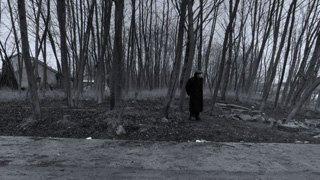A Yangtze Landscape
 CHINA / 2017 / Chinese / B&W / Blu-ray / 156 min
CHINA / 2017 / Chinese / B&W / Blu-ray / 156 min
Director, Photography, Editing, Sound: Xu Xin
Music: Frances-Marie Uitti, Gareth Davis
Sound Design: Lou Kun
Executive Producers: Linda Kim, Annie Song
Presented by: Yang Jing, Zhou Hang
Producers: Xu Feixue, Zhang Jun, Lu Zhixin
Production Company, Source: Xu Xin Documentary Film Studios
This film captures the scenery of the Yangtze River travelling upstream from Shanghai to the juncture at Yibin and on to Tibet, as well as the people—some of whom are homeless—living along the shore. Some of the places look like ruins, while massive cities or breathtaking vistas also come into view. There is almost no dialogue, with titles alone documenting facts such as the number of people that have died in accidents and violence at each location. Within the film’s leisurely cinematic pace, the vastness of China and the chaos of its modern age are laid bare.
[Director’s Statement] In 2012, Yang Chao, director of the narrative film Crosscurrent, invited me to follow their production team and independently make a documentary about the Yangtze. I was born by the lower Yangtze River in Taizhou city, so I’ve had a deep impression of the Yangtze from the time I was a boy. Since 1949, the government has engaged in a propaganda strategy of pitching the Yangtze as the “Mother River,” but today we find, as a result of China’s irrational development, that the Yangtze’s culture and ecology have suffered grave destruction.
In this documentary, which employs a non-narrative style with almost no dialogue throughout, the Yangtze is a metaphor for the current chaos in China. The camera is mounted on a boat, and long and fixed shots are used extensively. The boat becomes a tripod traveling on a huge moving camera track—the Yangtze.
The landscape as seen from the river is captured through the camera’s simple and serene observation. Departing from Shanghai, where the Yangtze flows into the ocean, the film travels through Nanjing, Wuhan, the Three Gorges Dam, Chongqing, upstream to Yibin, and continuing by land to the river’s source in Qinghai, finally reaching the Tibet Autonomous Region—travelling a total distance of over 10,000 kilometers. When I edited the film, I tried to recreate the strange atmosphere that lingers in this reality, by intermingling experimental music with sound recorded on location. The people appearing in the film are like figures added as secondary elements to landscapes in scrolls by traditional Chinese painters. Watching the film, you will come to realize that it is a dead Yangtze—nothing more or less other than a portrayal of today’s China.
 Xu Xin
Xu Xin
Born in Taizhou, Jiangsu Province, in 1966. He is an independent documentary filmmaker based in Beijing and Nanjing. He graduated from the Fine Arts Department at the Jiangsu Institute of Education, and has exhibited his oil paintings and photographs in art galleries both in China and around the world. He started making independent documentary films in 2000. His work often depicts the Chinese underclass, or those on the periphery of Chinese society. He sees making documentaries as a way of taking part in the creation of history. His works include Ma Pi (2002), Carriage (2004), Fangshan Church (2005), Torch Troupe (2006, Documentary Dream Show: Yamagata in Tokyo 2008), Karamay (2010), and Pathway (2011).
